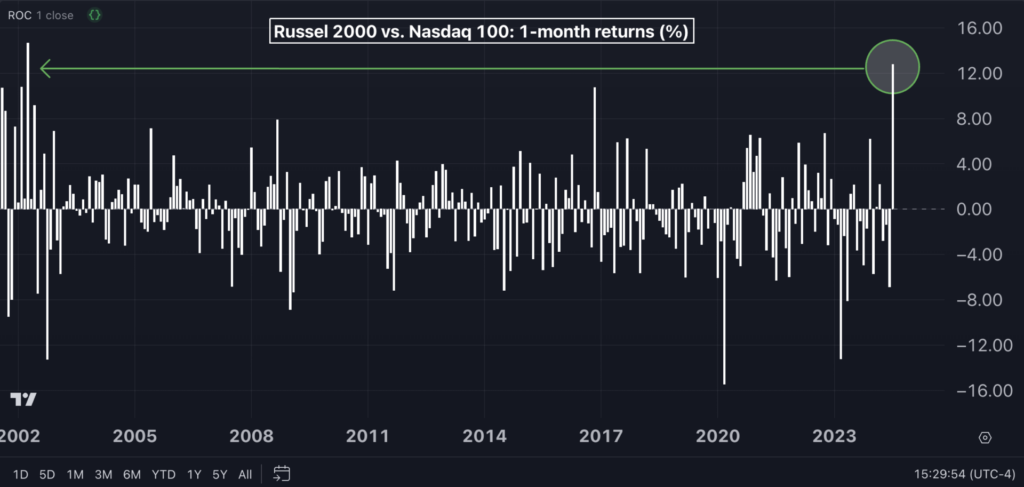Investors Go All In On Small Caps, Pour Over $6 Billion Into Russell 2000 ETF This Month: They 'Will Return To Larger-Cap Alternatives,' Veteran Analyst Says
Investors are increasingly bullish on small-cap stocks, driven by optimistic projections for the interest-rate-sensitive segment of the market to thrive as the market approaches the onset of a Federal Reserve rate cut cycle.
July has been a pivotal month, as small caps significantly outperformed large caps, especially in the tech sector, which dominated during the nearly two-year bull market.
The Russell 2000 index has surged nearly 9% month-to-date compared to a 3.6% decline for the tech-heavy Nasdaq 100 as of July 25.
The performance gap of nearly 13 percentage points in favor of the Russell 2000 over tech marks the best month for the “long small cap, short tech” trade since April 2002, highlighting the strength and speed of the ongoing market rotation.
Chart: It’s The Best Month In Over 2 Decades For The ‘Long Russell 2000, Short Nasdaq 100’ Trade

Strong Inflows Into Small-Cap ETFs
The impressive performance of small-cap stocks has been mirrored by significant inflows into major small-cap-focused ETFs.
The iShares Russell 2000 ETF (NYSE:IWM), one of the largest ETFs tracking the U.S. small-cap index, saw over $6 billion in net inflows this month, marking the highest influx of 2024 to date, according to data from Etfdb.com.
Several other small-cap ETFs have also drawn considerable investor funds this month:
- iShares Core S&P Small-Cap ETF (NYSE:IJR): $645 million in net inflows
- Avantis U.S. Small Cap Value ETF (NYSE:AVUV): $553.28 million in net inflows
- Invesco S&P SmallCap Momentum ETF (NYSE:XSMO): $350 million in net inflows
- SPDR Portfolio S&P 600 Small Cap ETF (NYSE:SPSM): $188 million in net inflows
Year-to-date, the Vanguard Small-Cap ETF (NYSE:VB) and the Pacer US Small Cap Cash Cows 100 ETF (NYSE:CALF) have attracted the most investor money, with $3.1 billion and $2.9 billion, respectively.
A Different Perspective
Despite the strong performance of the Russell 2000 index and the substantial inflows into small-cap ETFs, some experts urge caution.
“Investors and analysts are hopeful that the end of the Federal Reserve's tightening cycle will bring better days for smaller companies, particularly those that rely on debt to fund operations. We're not convinced,” said veteran Wall Street investor Ed Yardeni in a note.
Larger companies, especially in the technology sector, possess advantages that smaller firms cannot easily replicate, he said.
For instance, major tech firms are sitting on significant cash reserves, enabling them to fund substantial capital expenditures and R&D budgets, maintaining their competitive edge.
To give some examples, Alphabet Inc. (NASDAQ:GOOGL) sits on a stockpile of cash equalling $111 billion at the end of last quarter. Amazon.com Inc. (NASDAQ:AMZN) and Microsoft Corp. (NYSE:MSFT) have cash reserves of $87 billion and $80 billion, respectively.
Their financial flexibility allows for strategic acquisitions of smaller companies with important new technology or business lines. Microsoft’s $10-billion investment in OpenAI, the developer of ChatGPT, last year exemplifies this capability.
Yardeni suggests the fastest-growing, highest-potential companies may have already partnered with large-cap firms or private equity investors.
“That, of course, implies that the laggards are left to trade in the S&P 400 and S&P 600—suggesting that investors will return to larger-cap alternatives sooner rather than later,” he said.
Read Now:
- Contrarian Analyst Turns To Bonds Ahead Of Fed Rate Cuts, Presidential Election: ‘Maybe Tariffs Deflationary Not Inflationary’
Photo created using artificial intelligence via MidJourney.